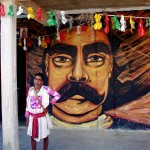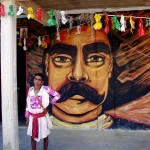By David Kennedy
In July, I traveled to Chiapas, Mexico with a group from Global Exchange, a human rights organization in San Francisco, CA. Chiapas is the southernmost state in Mexico, bordering Guatemala. Our delegation was based in the colonial town of San Cristóbal de Las Casas, a city where a surprise battle in 1994 touched off the globalization debate. We had a full agenda while there, traveling to surrounding communities to speak with indigenous and campesino organizational leaders, activists, educators, students, and artisans. We visited several indigenous communities, a coffee cooperative, and met with diverse organizations and their representatives in the area: from religious and community leaders, to non-government civic organizations and women’s cooperatives, all working for peace and stability in the region. Our group focused on agriculture, fair trade, the global economy, and immigration, and we also learned a great deal about the direct effects of globalization in the context of “free trade” and NAFTA (North American Free Trade Agreement). Though I live in the border state of Arizona, I didn’t expect to meet people in Chiapas, far more than 1,000 miles away from the U.S.-Mexico border, who had migrated across the border into Arizona. Moreover, each time I spoke with a cab driver or someone local, the very first thing they would mention after hearing I was from Arizona was The Minutemen. Here we were, so far away from the border, yet it seemed everyone was conscious of this vigilante group, though many in my own delegation were not. Five years ago, migrants were not coming to the U.S. from Chiapas. These days, many people are leaving Chiapas, especially the young, and either never returning or coming backed transformed (they don’t take the same jobs, dress and eat differently, and generally don’t take part in their culture). This transformation of the young essentially kills the cultural heritage and traditions of entire communities, and it particularly impacts indigenous communities. Immigration, already a hot issue, is getting worse everyday. More people are crossing the border, and the number of tragic migrant deaths along the Arizona-Mexico border is continually increasing. The desperation of migrants grows each day, and with it, the attitude in the U.S. towards immigrants is worsening. Rarely are those that die crossing the border referred to as “people,” “migrants,” or “human beings,” but rather as “illegals,” “aliens,” or “criminals.” It is a very methodical way of dehumanizing people who are economic refugees, adding yet another sad chapter to an already extensive American history of this despicable practice.
Immigration has always existed, but it has increased tenfold since NAFTA was enacted in 1994. Officially, government statistics say migration to the U.S. from Mexico has, at the very least, tripled in the last decade. The reality is that it is even higher, but tripling in the past decade? Could it be just a coincidence this has occurred since NAFTA was enacted? The root causes of migration, mainly failed policies promoted by NAFTA and the structure of the economic system, create the economic destitution that generates, predictably, mass departure. Obviously we have to look at immigration in a historical context, but NAFTA is a real watershed event. One reason for the ensuing flood of immigrants is that government subsidized corn from the U.S. is being dumped on Mexican markets at artificially low prices. Billions of our tax dollars are being used to subsidize agribusinesses, the vast majority of it going to a few HUGE corporations rather than the dying breed of small family farmers. These subsidies allow agricultural products to be sold for less than the cost it took to produce them. In the past, Mexico placed protective tariffs on imports from the U.S., but NAFTA eliminates these. Mexican farmers, who are not subsidized and generally work small family or communal farms, can not compete with Cargill, ADM, Monsanto, or other multinational conglomerates. Consequently, Mexican farmers are left with a crop they sell for less than it cost them to produce, hence they go into more and more debt and become further impoverished. This is simply a raw deal, a rigged trade policy that is driving millions of farmers off their land and into the cities to look for work, where jobs are already scarce. Overwhelmed in accommodating this population influx, the cities provide few opportunities and inevitably Mexicans head north of the border rather than live in poverty and starve. In fact, a large percentage of the people migrating to the U.S. are family farmers and campesinos who work the land. Migration has literally become a “survival strategy” for millions left jobless. NAFTA has failed the Mexican and American people, clearly a tragic failure for the Mexican people, but it has certainly been a boon for corporations. One answer to curb rising immigration is to cut off corporate welfare funding to Cargill, ADM, Monsanto, etc. so that Mexicans can make a decent living and remain with their families, in Mexico, which is what they would prefer to do.
While in Chiapas, we met with agricultural workers and representatives and learned about issues surrounding Mexican agriculture. For example, the Mexican border state of Chihuahua used to produce apples for the country, but since NAFTA was enacted, cheaper apples are imported from the U.S. (again, subsidized by the U.S. government). Domestic apple growers protested to the Mexican government, which responded in typical “free trade” talk: ‘the Mexican public can now save money buying cheaper apples.’ While Mexicans may be able to save money, what happens to the side of the economy that produces? If we don’t produce, we don’t earn, we can’t buy. With NAFTA, people are seen only as consumers of cheaper goods, nothing more. The irony is that those apples imported from the U.S. are picked by Mexican migrants left jobless by “free trade” policies who have come to work in the U.S., and it seems much of the American public doesn’t want them. There is a clear double standard here. Immigrants are demonized while the economic policy that causes migration and the corporations that benefit from it get a free ride. The reality is that so-called “free trade,” and indeed capitalism, forces people across borders—it is inevitable. It is a known and expected consequence of NAFTA, and it should be noted that the migratory effects were known about beforehand by both the U.S. and Mexican governments. It is not that they didn’t know, it’s that they simply don’t care. Not coincidentally, the U.S. has spent billions militarizing the border since 1994, with such missions as Operation Gatekeeper, Operation Blockade, Operation Safeguard, Operation Hold-the-Line, Operation Triple Strike, and Operation Rio Grande. None of this has slowed immigration. It is yet another example of America attacking the symptom, in this case immigration, instead of the disease, the economic system, which is the source of incredible misery, exploitation, and wealth disparity throughout the world.
Coffee, along with corn, is an ever-present crop in Chiapas, and the state is one of the largest producers of organic coffee in the world. Meanwhile, the United States is the largest consumer of coffee in the world, devouring one-fifth of the global total. At the same time, most Americans are unaware of the poverty and dire conditions that coffee workers are left in. Small coffee farmers, too, receive prices for their coffee that are less than the costs of production, forcing them into a cycle of poverty and debt. Over the last decade, coffee prices have plummeted, resulting in hundreds of thousands of coffee farmers being forced to leave their lands. It is one thing to read about this happening, but quite another to see and meet with people who personally experienced this, and it deeply affected me. Currently, the world market price for coffee is (approximately) a pitifully low $.55 per pound. Alternatively, Fair Trade farmers are paid a minimum price of $1.26 per pound. With Fair Trade, farmers, workers, and artisans receive a sufficient price and agree to not use abusive child labor or forced labor, and to use ecologically sustainable methods. What it results in is investment in community development, education, healthcare, and environmental stewardship.
One of my most eye-opening experiences was when our group visited MayaVinic, a Fair Trade certified coffee cooperative. Meeting with representatives of the coop, we learned all about coffee, everything from planting the seed to the harvest to the market. You might say it was “Coffee 101,” with the class meeting inside the MayaVinic warehouse. After a 3 hour presentation and a question and answer session, we took a field trip to the coffee farm, in this case the farm being the jungle since the coffee is shade grown under the canopy of the trees. I was amazed, and somewhat disturbed, at how labor-intensive coffee farming is. All the weeding and picking is done entirely by hand on steep hillsides that go on for acres and acres, seemingly, without end. The Mayavinic community also has a firm belief in growing coffee organically and being stewards of the land. Can Fair Trade make a difference in the lives of individuals and communities? It does make a difference. We saw a notable difference between the indigenous communities that sell their coffee at the world market price and those that sell to the Fair Trade market. The Fair Trade communities typically had more adequate housing, infrastructure, and development, whereas some of the world market communities did not have electricity or running water. With the more equitable price, the MayaVinic coop is able to invest more money and resources into health, education, housing, and community development. Kids do not have to work and can go school. The coop members were able to buy a truck to provide transportation for community members, as well as to move the coffee. In short, they had more economic security and autonomy. This is the type of economic development that allows for families and communities to stay together instead of being torn apart as young people, especially, migrate in search of work.
Purchasing Fair Trade certified coffee is a concrete and easy example of how each of us can address the immigration issue, by changing the economics of what causes immigration in the first place. It’s a win-win situation. Certainly first world consumers can afford to pay a minimal increase in price in order to provide a sustainable income to third world farmers so they may live in dignity. Buying a Fair Trade cup of coffee is a simple action that makes a difference in people’s lives. It provides the economic security necessary for communities to maintain their families and their land. A serious examination of immigration forces us to take a more critical look at the economic system that produces such poverty that engenders immigration in the first place. Questioning and learning more about the structure and underlying motives of NAFTA and capitalism reinforces the assertion that an alternative economic system must be built, as the status quo is no longer an option. To “secure” borders, the incredible wealth disparity between (and within) rich and poor nations must be narrowed. If we are to truly address immigration, we can not allow human beings to live in economic misery and exploitation, at best, and economic slavery at worst. It is simply not fair, not just, and not humane.



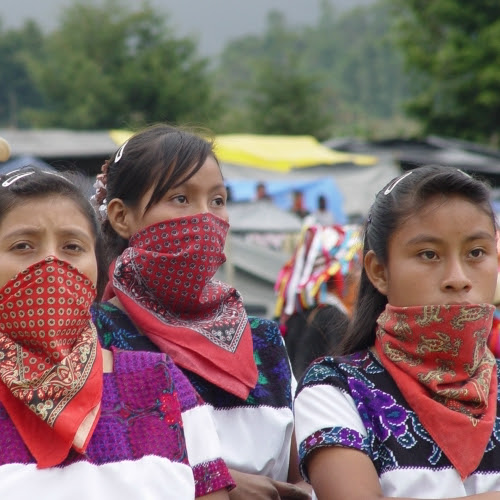
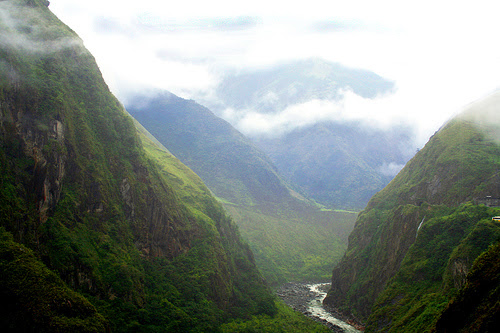
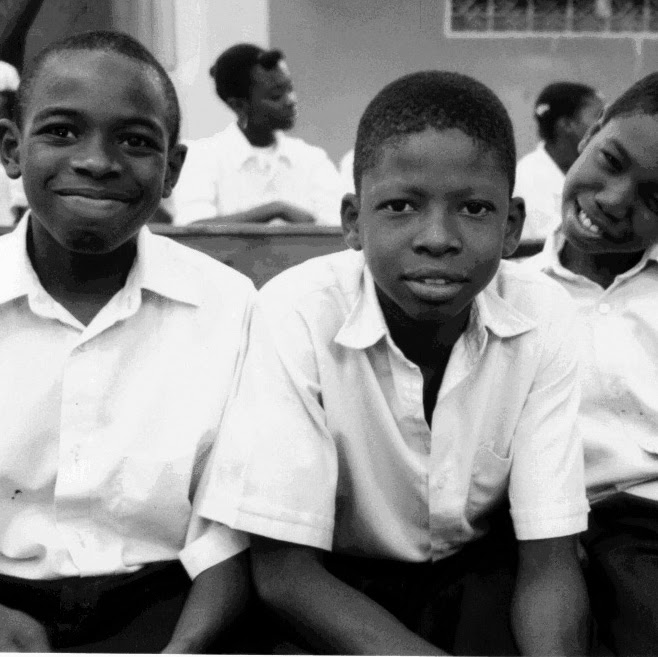
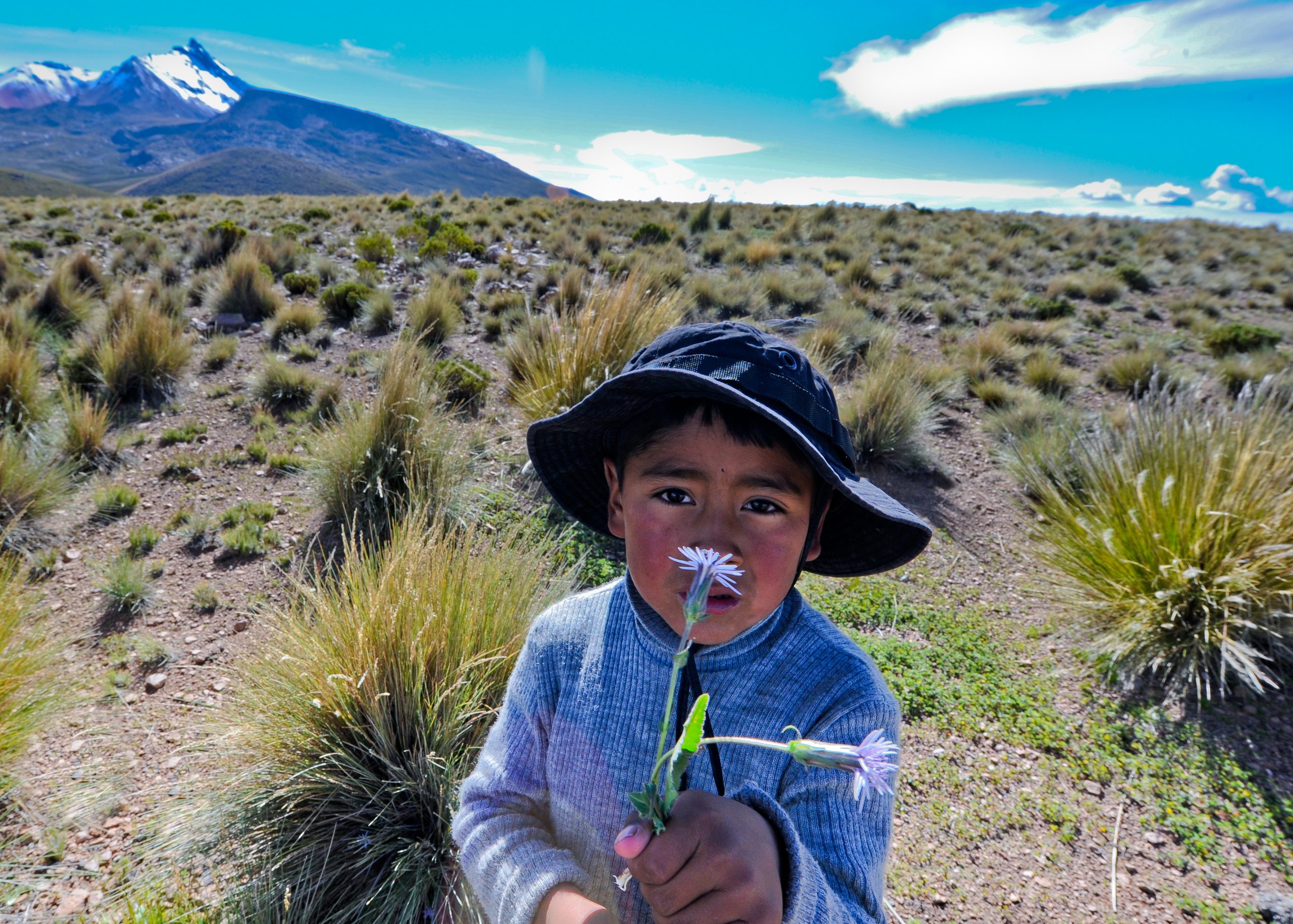

.jpg)
.jpg)
.jpg)
.jpg)



